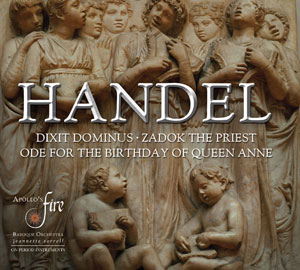Handel: Dixit Dominus; Zadok the Priest; Ode for the Birthday of Queen Anne. Apollo’s Fire Baroque Orchestra and Apollo’s Singers, conducted by Jeannette Sorrell, with Kiera Duffy, soprano, and Meg Bragle, mezzo-soprano. (Avie: AV2270).
In the upper Midwest, monoculture of potatoes and corn (primarily to supply fast food franchises) threatens to obliterate entire crops someday. Similarly, the juggernaut of Yuletide performances of Handel’s "Messiah," to the exclusion of virtually any other choral works of any magnitude, threatens to bury the rich baroque choral tradition of Georg Friedrich Handel and many of his contemporaries. Particularly in the United States, under-rehearsed, gargantuan performances––or worse, “Sings” where little or no rehearsal or preparation is expected or even desired––cast a pall over the broad variety of Handel’s choral oeuvre. So sing a loud Hosanna to Cleveland’s resident early music band, “Apollo’s Fire,” for their release of a period performance of four of his shorter, but nonetheless important choral achievements: “Dixit Dominus,” “Ode for the Birthday of Queen Anne (“Eternal Source of Light Divine”),” “The Lord Shall Reign,” and “Zadok the Priest.”
The disc begins with a stunning and wonderful surprise: a timpani processional, “Batteries de timbales” of J. D. Philidor, played by the superb Matthew Bassett, that sets the listener up for the audio feast that follows. (If any couple should want to forego Mendelssohn for a wedding processional, take a gander at this for maximum attention-getting!). What follows under the expert direction of conductor (and founder) Jeannette Sorrell is a cross section of the variety of Handel’s choral output over several decades in his early career.
What you will hear never smacks of pedantic authentic performance practice, though, indeed, the size of the forces and the instruments used are all authentic. The choral singing is full-bodied and exuberant, the soloists––even when occasionally leaning toward more modern singing practice (i.e. perhaps a tad less vibrato at times might be welcomed)––all bring an excitement to the works that will bear listening to many times over.
The least familiar of the works to the average concert-goer is unquestionably the “Ode for the Birthday of Queen Anne” (according to the fine notes included with the disc, intended for her 48th birthday in 1713 but never performed). Although it is an “occasional piece,” written by a young German composer for a British monarch, to a text that manages to rise beyond the sometimes painful, embarrassing odes written to celebrate state events, the music is superb, wonderfully varied, and in the final chorus that celebrates “The day that gave great Anna birth” quite dignified and even moving. We can only hope that when she recovered the indisposition that caused the performance to be cancelled, she had an opportunity to hear it, especially sung as beautifully as it is here.
This disc is altogether a gem. It will serve as a wonderful antidote at that time of year when every classical music station, every concert hall, and every church from hamlet to megalopolis seems capable only of yet one more tired, uninspired read-through of "Messiah."
David Anderson


No comments:
Post a Comment